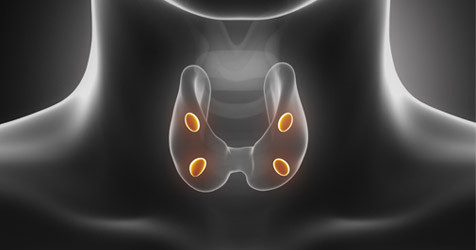WHAT IS THYROID CANCER?
Thyroid cancer affects the thyroid gland, which is in the front of the neck. Thyroid cancer is not common, but diagnoses are increasing.
WHAT ARE THE TYPES OF THYROID CANCER?
There are 5 types of thyroid cancer:
- Papillary Thyroid Cancer
- Follicular Thyroid Cancer
- Medullary Thyroid Cancer
- Hurhtle Cell Carcinoma, also called oxphil cell carcinoma
- Anaplastic Thyroid Cancer
WHAT ARE THE SYMPTOMS OF THYROID CANCER?
The first symptom to appear may be a small, painless lump in the neck, although not all such lumps are cancerous.
Later symptoms may include:
- Pain in the neck and throat
- Hoarseness, or problems speaking with a normal voice
- Swollen lymph nodes in the neck
- Breathing difficulties
WHAT ARE THE RISK FACTORS FOR THYROID CANCER?
A number of factors can increase the risk of developing thyroid cancer:
- Radiation exposure, especially in early childhood, increases the risk of developing thyroid cancer.
- Some health conditions or diseases can increase the risk. People with Hashimoto's thyroiditis, Cowden's syndrome, thyroid adenoma and familial adenomatous polyposis have a greater chance of developing thyroid cancer.
- Genetic factors can increase the chance of developing medullary thyroid cancer. Around 25 percent of people who develop medullary thyroid cancer have an abnormal gene.
- Lack of iodine in the diet can increase the risk.
HOW IS THYROID CANCER DIAGNOSED?
The first step will be to examine the patient's neck and throat and to ask questions about the symptoms. A blood test will measure thyroid function by assessing the levels of specific hormones in the blood. High levels of thyroxine and triiodothyronine suggest an overactive thyroid gland, while raised levels of thyroid stimulating hormone (TSH) suggest that the thyroid gland is underactive. TSH is produced by the pituitary gland in order to stimulate the thyroid gland. Blood tests are not used to diagnose thyroid cancer but can tell if the thyroid if functioning properly.
Fine-needle aspiration cytology, or a biopsy, which involves passing a small needle into the swelling in the patient's neck, removes a sample of cells for examination under a microscope. This biopsy will reveal whether a lump is cancerous, and, if so, what type of cancer it is.
If the results are inconclusive, a biopsy may be carried out surgically, to remove a small sample of the thyroid gland to see if it contains cancerous cells.
Imaging scans such as ultra sound, radioiodine scan, chest x-ray, CT or PET scan or MRI scan may also be needed.
WHAT IS THE TREATMENT FOR THYROID CANCER?
Many cases of thyroid cancer can be treated and cured through surgery, radioactive iodine or radiotherapy, or a combination of these treatments.
Surgery is a treatment option for thyroid cancer. Common types of surgery include:
- Thyroidectomy, the surgical removal of the thyroid gland. If cancer has moved to lymph nodes in the neck, the surgeon may also remove these.
- Lobectomy, or hemithyroidectomy, the surgical removal of one of the lobes of the thyroid gland.
Other therapy treatments include:
- Thyroid hormone therapy, in the form of hormone replacement medication, will be necessary, if the thyroid gland is completely or partially removed. The patient will need this treatment for the rest of their life, as well as regular blood tests to make sure the hormone levels are adequate.
- Radioactive iodine therapy may be needed after surgery, to prevent the thyroid cancer from returning. The patient may need to follow a low-iodine diet two weeks prior to treatment with radioactive iodine. Pregnant women should not receive radioactive iodine treatment.
- External radiation therapy, or radiotherapy, is normally only used for medullary or anaplastic thyroid cancers.
- Chemotherapy is usually only used to treat anaplastic thyroid cancer that has metastasized, or spread to other parts of the body.
- Newer treatments like targeted oral therapies can sometimes be used in later stage thyroid cancers when other treatments are no longer effective.
WHY KIMS?
The best thyroid cancer treatment in Hyderabad, Kondapur is inarguably available at KIMS. The multidisciplinary management of thyroid cancer is a collaboration among nuclear medicine specialists as well as the best thyroid cancer specialist in Hyderabad. The best thyroid cancer surgery specialist in Hyderabad works closely with other experts and collaborates together to craft a personalized treatment plan for each patient.
